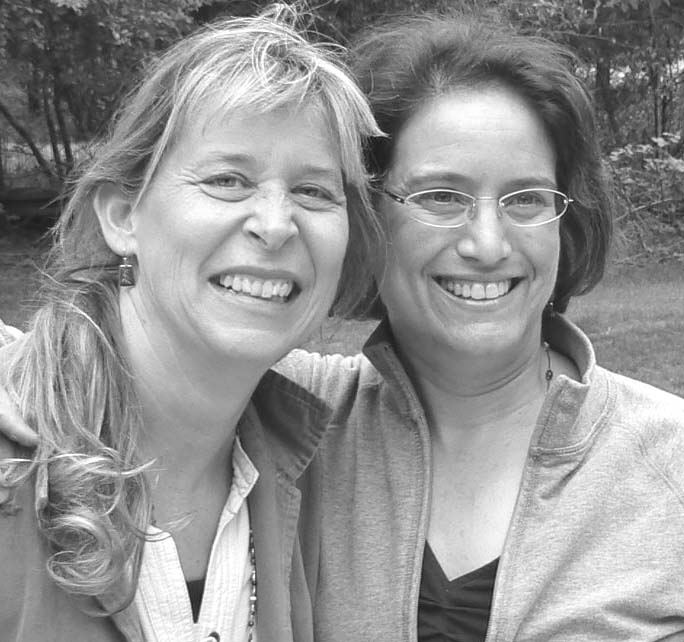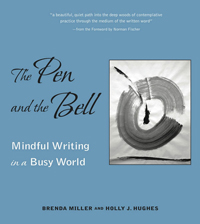Writing serves a purpose greaterthan the product alone; it becomes
a spiritual practice, a way to connect
ourselves to that "presence,"
however it manifests in our lives.
Because direct questions offer endless insight, I'm happy to present Fast Five — short interviews with my favorite writers. Life may be short but who doesn't have time for five questions?
 Holly Hughes and Brenda Miller are writers, friends, and authors of The Pen and the Bell: Mindful Writing in a Busy World. Both are accomplished: Holly is a poet, professor, and editor of the award-winning anthology Beyond Forgetting: Poetry and Prose about Alzheimer's Disease; Brenda is editor of the Bellingham Review, and a Pushcart Prize-winning author who teaches at Western Washington University. And both are deeply introspective writers who believe that "writing can be a rich, active form of paying attention to the self and the world."
Holly Hughes and Brenda Miller are writers, friends, and authors of The Pen and the Bell: Mindful Writing in a Busy World. Both are accomplished: Holly is a poet, professor, and editor of the award-winning anthology Beyond Forgetting: Poetry and Prose about Alzheimer's Disease; Brenda is editor of the Bellingham Review, and a Pushcart Prize-winning author who teaches at Western Washington University. And both are deeply introspective writers who believe that "writing can be a rich, active form of paying attention to the self and the world."
I'm intrigued by, and appreciative of, the letter writing practice that led to the creation of The Pen and the Bell. What prompted your correspondence?
Holly: That was one of the wonderful serendipities of this collaboration, as we really just fell into it. We’d drafted an outline with chapters then met to discuss our plan. At the end of our session, we decided it looked too formal for the organic process we’d envisioned, so we decided to continue to correspond by letters (via email) instead. Thankfully, we both had a sabbatical that fall, and so the timing was good. Within a few months, we were both loving the correspondence — I was always delighted to find a “Letter from Brenda” in my In Box — and we quickly recognized that our letters were becoming the book we’d envisioned.
Brenda: Yes, serendipity is the right word, because the idea seemed to just arrive — to materialize as a message to which we both said, “of course.” And once we started writing, it was so much fun that it was actually hard to stop. I think I wrote three letters in the first week!
 In the introduction you write that it is important to "carve out space for writing in a world crowded with distraction." In a few words, how does one master this seemingly impossible feat?
In the introduction you write that it is important to "carve out space for writing in a world crowded with distraction." In a few words, how does one master this seemingly impossible feat?
Holly: It’s hard to answer this in a few words — we share many specific strategies in The Pen & The Bell — but the premise of the book is that by combining mindfulness practice with writing practice, it’s more possible to carve out space and time; the two practices can work synergistically to support each other. For example, by meditating or reading a favorite poem aloud (contemplative reading) before writing, you can more quickly enter a creative state — where the more authentic writing comes from. Other than that, we give suggestions for taking whatever time you have — at a red light or walking to work—to breathe deeply and re-connect with yourself throughout a busy day — and these small mindfulness practices allow us to bring more of our undistracted selves to the page.
Brenda: It’s really about learning to write more quickly — not spending time “thinking” about writing or agonizing about it, but simply writing, even if you have just a few minutes. We give you lots of prompts — in the book and on The Pen and the Bell website — that can give you places to start. It’s also a matter of prioritization: really getting a sense of why writing is important to you, and forming a community (a community can consist of even just one other person) that helps you value this priority.
What did you gain in the process of writing this book, and what do you hope readers will experience? (I cheated, that's two questions!)
Holly: I’ll address the first question. I think we wrote this book for ourselves — we’re both teaching writing full-time, seeing first-hand all the distractions that we and our students face on a daily basis, distractions that sometimes keep us from writing. As the letters evolved, it became clear that we were letting our creative muse help us find strategies that felt in keeping with both the challenges — and the deeper core values — of our own lives.
Brenda: Yes, and we hope our readers will experience the same thing: some support for their creative lives, an excuse or opportunity to slow down and remember what it feels like to focus in a deeper way than our hectic lives (and minds!) sometimes allow.
I like your idea that "contemplation is an active practice." For you, which came first: writing or mindfulness?
Holly: For me, writing came first, as I’ve been writing in a journal since I was a kid. They both came together twenty years ago when I was working as a mariner on the water in Alaska. Looking back, I view that time — what I called “wheelwatch practice” — as a form of mindfulness practice. I began attending meditation retreats and receiving formal instruction about 12 years ago. I became particularly interested in mindfulness practice after reading several books by the Vietnamese monk Thich Naht Hanh and was lucky enough to attend a week-long retreat at Deer Park Monastery in California when he was in residence.
Brenda: I’ve been writing since I was 7 years old, so I guess writing came first! Though children do seem to be naturals at contemplation as well; they can focus a long time on insects, animals, blades of grass. . . I was always kind of a moody child — quiet, introspective — and so perhaps those two modes have always coincided for me.
I'm a collector of words. What are your favorites?
Holly: What a fun question, Drew! I must admit it’s difficult to choose; there so many words I love, both for their meanings and their sounds, their feel as they roll off your tongue. But here are a few of this week’s favorites: waterfall, bumblebee, pomegranate, bladderwrack, stipple. (The last is from a favorite Hopkins’ poem, Pied Beauty, that has many more great words).
Brenda: delicious, marble, agile, welcome, pineapple (I don’t know if they’re my favorite words, but they popped around in my mind while I pondered your question. Plus, I’ve been on a pineapple-eating kick lately, and the word just makes me feel happy.)
